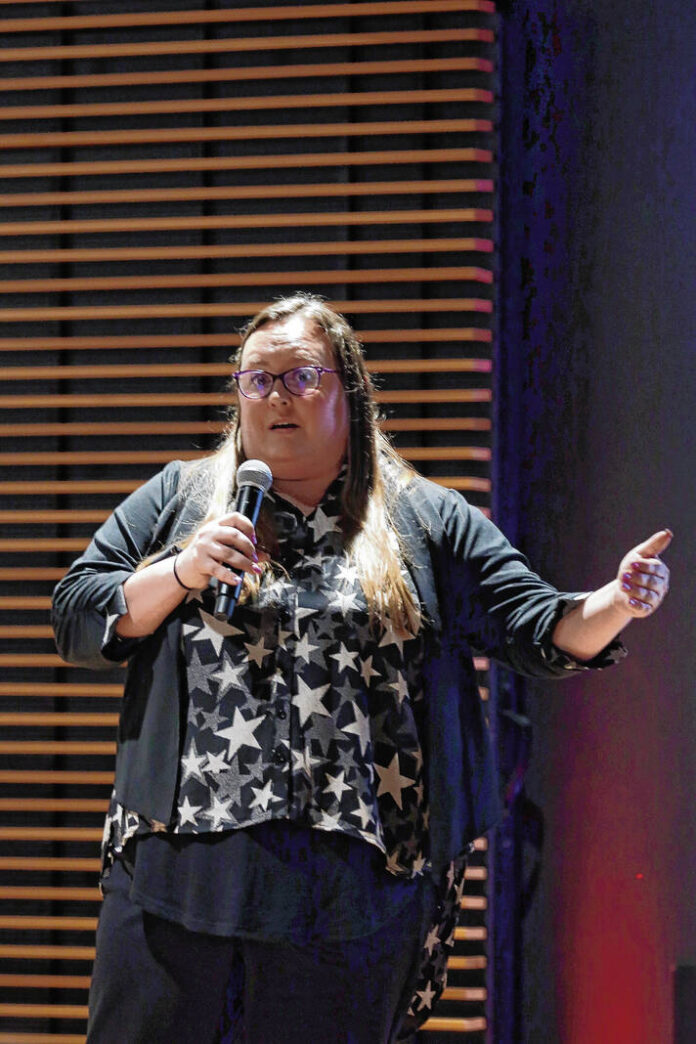
Kilah Dickey during her presentation Online Transcript System for High School Students at Ignite Columbus held at the Helen Haddad Hall, Wednesday, April 27, 2022 Carla Clark | For The Republic
By Jana Wiersema | The Republic
Two Columbus residents have launched a startup aimed at facilitating smoother transfers of student transcripts for middle and high schoolers.
Transcriptly co-founders Kilah Dickey and Brian Slater are working to build, as Slater put it, “an education interoperability platform.”
Merriam-Webster defines interoperability as the ability of a system “to work with or use the parts or equipment of another system.”
“Interoperability is not a novel thing,” said Slater, who is a software engineer by trade and is the vice president of technology innovation at Patient Pattern, Inc. “Interoperability is a tool that we can use to facilitate the transfer of information between trusted entities. Because the key here is that school — Bartholomew schools doesn’t trust Elkhart Community Schools by default. There’s no relationship there. So what we’re seeking to do is build on top of interoperability standards and then authenticate schools into our platform.”
When a customer enters the system, Transcriptly will authenticate their identity. Once schools are authenticated and part of the system, they will be able to request and authorize the transfer of transcripts.
Dickey and Slater also plan to make the platform available to students so that they can access their own information.
Transcriptly started with an idea Dickey had about five years ago when she was working as both a teacher and counselor at Clark-Pleasant Academy in Whiteland.
“I just noticed that there was no system where we could talk to each other,” said Dickey. “And really, it was just kind of a fleeting idea. And then, as I was working on an administrative project, I noticed that this is still a problem. I talked to a counselor and they mentioned that this is still happening, five years later. And so I couldn’t believe it.”
Then, when Dickey was driving one day, she heard about Ignite Columbus, a local version of a fastpitch competition that originated in Seattle and has become an international phenomenon. Speakers create presentations with 20 slides, and each slide is shown for 15 seconds — giving each speaker “5 minutes of fame.”
“I just thought to myself, ‘Hey, I’m moving to Columbus. I have a business idea. I’m going to sign up,” said Dickey. “So I signed up, not really knowing what to expect whatsoever and ended up pitching the business and meeting Slater at the Ignite event.”
Dickey participated in the competition this past April and won “Most Innovative” award, which came with a cash prize of $750. Her presentation showed an existing problem with transcript transfers and a possible solution.
Slater, who attended the event, was intrigued by the concept.
“I usually look at utilities and ask myself, ‘Why isn’t that a thing?’” he said. “Because it seems like, wow, I can’t believe that you can’t send a transcript from one school to another. Why wouldn’t that already exist? It’s pretty surprising.”
Slater said that one of the issues with how schools send transcripts to one another is that the burden often falls on individuals such as guidance counselors who “underpaid and overworked.”
He and Dickey are hoping their platform, once complete, will help relieve this burden.
“It’s not an issue of ‘Can they get the transcript?’” said Dickey. “It’s more of an issue of ‘How fast can they get the transcript?’ Because right now the delay is making students be placed in the wrong classes. And there’s just not that transparency between the school and the parents, the stakeholders and so that they can see exactly where they’re at in real-time and also have access to their data.”
Miscommunication can result in major problems for students, she said, such as taking the wrong classes or not getting all the credits they need to graduate.
According to Columbus Area Chamber of Commerce President Cindy Frey, Transcriptly recently secured a $20,000 investment from Velocities and Elevate Ventures. Slater said that they plan to use these funds for certain marketing, engineering and operational costs.
Amazon Web Services has also provided the business with $25,000 in credits for operations and $10,000 in business support credits.
At present, Slater and Dickey are working on prototyping, developing their product, raising funds and creating a brand identity and marketing.
While the two of them both live in town, the company itself is currently remote. However, Slater said he would love for Transcriptly to have an office in Columbus and become a bigger part of the local culture.
He and Dickey also think that, in time, the platform may transform in terms of scope and ownership.
“We have it (Transcriptly), right now, totally proprietary, but we also see a future where this actually becomes a network that is not owned by us and it’s actually owned by the members, which are students and schools and entities that need to transfer information,” said Slater.




